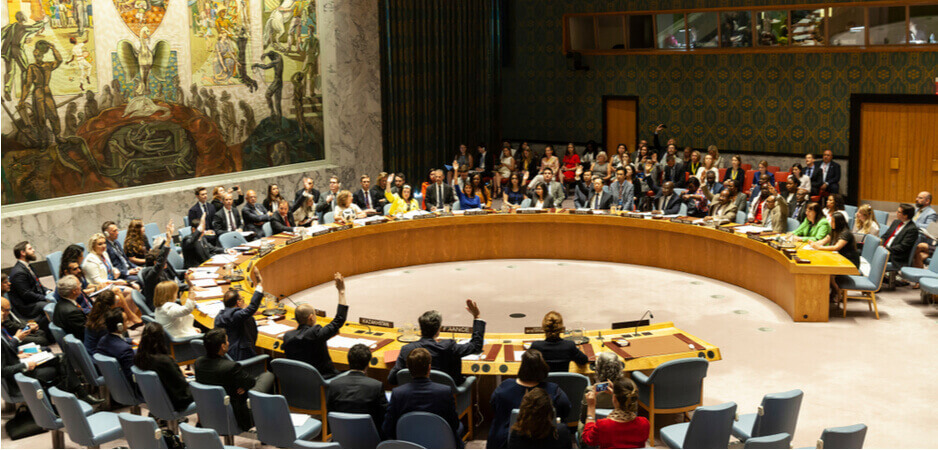On June 7, St. Vincent and the Grenadines was elected to a non-permanent seat on the United Nations Security Council (UNSC). The election of this multi-island nation of around 110,000 people came largely unnoticed. In fact, it is a historic occasion, since St. Vincent and the Grenadines is the smallest nation ever to secure a seat.
Many may argue that being an elected member and a small state will not give St. Vincent and the Grenadines any sufficient weight in the future discussions at the council to bring forward its agenda focused on sustainable development and raising awareness of the impact of climate change on small island states. However, this view dismisses the pivotal role small states play in shaping international law and upholding its tenets at the council, especially when tensions between permanent members jeopardize chances of securing resolutions.
Ranging from Malta’s introduction of the Law of the Sea, Guyana’s definition of the concept of “aggression” and New Zealand’s recent contribution to the protection of health care in armed conflict, small states actively contribute to the defense, promotion and enhancement of principles of international law. In the context of numerous crises and turmoil at the council, the election of St. Vincent and the Grenadines is welcome, as it can demonstrate how necessary small states are to policy debates.
Spiraling into Crisis
Since the start of 2019, the UN Security Council has failed to sustain a coherent policy in Sudan or resolve divisions between council members on the emergencies in Yemen and Venezuela, not to mention other crises in limbo, such as Eastern Ukraine and Libya. To date, the council appears wrecked by divisions and political sparring games, especially among its permanent members. International cooperation seems to be at a low point. However, the council’s inaction, coupled with irreconcilable differences over select issues like the Israeli-Palestinian conflict among others, risks to paralyze the body, undermining its broader credibility and escalating international tensions.
To address the ongoing fragmentation of UN diplomacy, the International Crisis Group argues that “Security Council members should preserve the forum’s utility by finding compromises where possible — such as on Sahel military missions, Libya and Venezuela — while accepting that some disputes may be intractable.” Ongoing tensions between permanent members contribute to this fragmentation. Positions taken by the Trump administration upset its traditional allies like France and Britain. Instead of focusing on joint efforts to stabilize the Sahel region and especially Mali, France and the US bicker endlessly over the costs and goals of UN and non-UN military missions in the region, without reaching a consensus.
Last year, the United States has threatened to veto a British-drafted resolution on Yemen because it insisted on humanitarian provisions and accountability for war crimes that would limit the Saudi-UAE operations. While such tensions between the US and its traditional allies occurred in the past, especially regarding the 1956 Suez Crisis and the invasion of Iraq in 2003, current divisions demonstrate how skeptical President Donald Trump is of the UN and its usefulness to his administration. His latest decisions on moving the US Embassy to Jerusalem last year and recognition of the Golan Heights as Israeli territory this March undermine what the Europeans have always cherished, namely that the UNSC remains an arbiter on Middle East affairs as a source of diplomatic leverage.
Let’s not forget two other worrying patterns increasingly present at the council: a climate of distrust between the Western powers, China and Russia, as well as growing tensions between permanent and elected members, especially expressed by African states’ frustration at the council’s handling of the continent’s affairs. While China often joins Russia in abstentions, its broader strategy continues to be opaque. Russia’s positions on Ukraine and Syria often bring UN diplomacy to a sudden halt.
Elected members, who have united in their frustration with the permanent members’ management of the council in the last two decades, also remain divided. Germany is siding with France to showcase a European front. Indonesia and South Africa, on the other hand, promote a more “southern” agenda that questions Western initiatives, and often side with China and Russia on controversial issues such as the Venezuela crisis.
While the council signals the overall poor state of international cooperation, it united to impose powerful sanctions on North Korea during the 2017 crisis and to back the Yemeni peace process in 2018. Elected members have also attempted to make the council more efficient. Sweden played a crucial role last year in shaping the peace efforts in Yemen. The success achieved by Sweden exemplifies what a small state can do without the burden of being a permanent member or a large state.
Small Voices
Small states have comparative advantages over larger states, since they can more effectively maneuver policy debates without being hampered by a large and impersonal bureaucracy, as well as focus on fewer and more specialized issues that enable them to develop expertise in niche diplomacy areas. For instance, Costa Rica championed the 2013 Arms Trade Treaty, later adopted by the UN General Assembly. As a recent International Peace Institute report highlights, small states can serve as “effective champions of rules-based order” and international law in a system dominated by large powerful states.
The work of small states to push for humanitarian action in Syria exemplifies how small nations can build bridges between rival members at the council, especially among P5 members. Small states such as Jordan and New Zealand played a pivotal role in brokering consensus on sensitive humanitarian issues and the protection of medical care in Syria, which led to the adoption of three resolutions (2139, 2165 and 2286). While these efforts still need to be translated into reality on the battlefield, such achievements demonstrate the ability of small states to give leverage to international issues and, in doing so, to increase advocacy and accountability.
It is in the interest of small states to safeguard and uphold international law standards, because if the system deteriorates, their global standing will likely be jeopardized and be put at risk due to their limited military capacity. The example of Kuwait illustrates this point, when the UNSC authorized the use of military force to compel the withdrawal of an invading Iraqi army in 1990. The council is viewed by small states as a first line of defense, even if the council takes what Sir Adam Roberts, a senior research fellow in international relations at Oxford University, refers to as a “system of selective diplomacy,” especially when a permanent member is engaged in a conflict, such as the current standoff between Russia and the US over Ukraine at the Security Council.
Jim McLay, New Zealand’s former permanent representative to the UN, stresses that small states have a strategic interest to safeguard the UN system and defend principles of international law to ensure their participation as “equal partners in global discussions.” Also, by becoming defenders of international law principles and humanitarian standards, small states enhance their credibility as well as the legitimacy of the UNSC, which should always remember its obligations under international law.
With fewer resources, smaller diplomatic representations and a higher chance to be influenced by the military or economic power of larger states, small states face numerous challenges in having their legitimacy recognized on the international scene, in particular at the UNSC, since they do not benefit from having veto powers or a permanent status. The contrast in the interpretation of international law by Bolivia and Sweden regarding the legality of the US, UK and French coalition airstrikes in Syria last April also showed that small states do not stand united in the application and interpretation of international law, even if small states are more “strategically inclined” to be defenders of such principles. Small states also face an increasing intolerance by larger and powerful governments determined to enforce their objectives on the rest of the world.
While in principle the UN system guarantees sovereign equality, for historical reasons most of the influence lies in the hands of the permanent members. Small states need to maneuver policy debates strategically to boost their credibility in the eyes of the permanent members. The election of St. Vincent and the Grenadines gives the opportunity for small states to demonstrate that “small size is no obstacle to contributing meaningfully to resolution of issues that confront the world.” Therefore, one hopes that St. Vincent and the Grenadines will be able to do exactly that as a small state defender of international law during its term as an elected member of the UN Security Council starting in September 2019.
The views expressed in this article are the author’s own and do not necessarily reflect Fair Observer’s editorial policy.
Support Fair Observer
We rely on your support for our independence, diversity and quality.
For more than 10 years, Fair Observer has been free, fair and independent. No billionaire owns us, no advertisers control us. We are a reader-supported nonprofit. Unlike many other publications, we keep our content free for readers regardless of where they live or whether they can afford to pay. We have no paywalls and no ads.
In the post-truth era of fake news, echo chambers and filter bubbles, we publish a plurality of perspectives from around the world. Anyone can publish with us, but everyone goes through a rigorous editorial process. So, you get fact-checked, well-reasoned content instead of noise.
We publish 2,500+ voices from 90+ countries. We also conduct education and training programs
on subjects ranging from digital media and journalism to writing and critical thinking. This
doesn’t come cheap. Servers, editors, trainers and web developers cost
money.
Please consider supporting us on a regular basis as a recurring donor or a
sustaining member.
Will you support FO’s journalism?
We rely on your support for our independence, diversity and quality.






